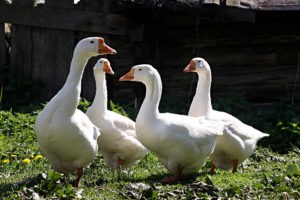Considering a pet that’s a bit out of the ordinary? Perhaps you’ve pondered the idea of geese as pets, moving beyond the typical dog or cat. While images of park geese might spring to mind, often associated with assertive behavior, domestic geese, especially those raised by hand and consistently handled, can present a surprisingly docile and engaging pet option. However, before you welcome geese into your home, it’s essential to understand their needs and whether your lifestyle and living situation are a good fit for these unique birds. Owning geese requires adequate space, and it’s crucial to verify local regulations and homeowner associations to ensure keeping poultry, including ducks and geese, is permitted in your area. Let’s explore what makes geese tick and if they could be the right pet for you.
 Domestic geese. flock of white domestic geese on the farm.
Domestic geese. flock of white domestic geese on the farm.
Choosing the right breed is your first step in successful goose ownership. Numerous breeds are available, with many known for their amiable pet qualities. Dr. Sharman Hoppes, a clinical associate professor at Texas A&M College of Veterinary Medicine & Biomedical Sciences, suggests breeds like the Toulouse, American Buff, and Pilgrim geese, based on positive feedback from her clients. Geese are social creatures, thriving in flocks, so consider adopting two or three geese to create a more natural and content environment. Female geese often exhibit less aggression towards each other, making them potentially better suited as pet companions.
Providing appropriate housing is paramount for the well-being of pet geese. For comfortable living, ensure at least one square meter of indoor space per bird for nighttime shelter and two square meters each for outdoor areas. Outdoor housing should feature grassy flooring and secure fencing to protect your geese from predators such as rats, coyotes, and domestic dogs. A larger pen with lush grass is ideal for daytime roaming, incorporating a swimming area and robust protective fencing. A 20×40 foot pen generally accommodates three geese comfortably. “Pet geese thrive in a large yard with ample grass and housing that provides warmth during winter and respite from summer heat,” Dr. Hoppes advises. “Access to water for swimming is also vital; a pool or pond is a must. If using a smaller pool, daily cleaning is necessary. Geese are prone to overheating on hot days without water or shade.” Daily cleaning of their living area is an essential aspect of goose care.
Neglecting proper housing, particularly a grassy yard and swimming area, can lead to significant health issues in geese. “Geese kept without swimming water or on hard surfaces like cement are prone to developing foot problems that can become life-threatening,” explains Dr. Hoppes. “Being heavy-bodied birds, geese rely heavily on both legs for mobility. Inappropriate substrates can cause pressure sores on their feet, potentially leading to bone infections.” Other common health concerns include intestinal parasites, necessitating regular deworming, limb deformities in young geese due to nutritional deficiencies, and injuries from predators like dogs or coyotes. Mature female geese may also experience reproductive issues such as egg binding. “Prospective goose owners, and those considering waterfowl or backyard poultry, should ensure access to a local veterinarian experienced with avian care for routine check-ups and emergencies,” Dr. Hoppes recommends.
Dietarily, geese are primarily grazers. Grass constitutes up to 70% of their diet, underscoring the importance of a dedicated grassy area. In addition to grass, geese naturally consume insects and benefit from commercial waterfowl feed. These formulated feeds are available for different life stages and should be offered daily, according to Dr. Hoppes, to ensure a balanced nutritional intake.
Beyond companionship, geese offer several unexpected benefits. They are naturally territorial and make excellent alarm systems, alerting their owners to any perceived intruders. Despite their sometimes intimidating reputation, hand-raised geese are generally docile and unlikely to attack visitors, unless they are protecting nests or young goslings. Increased assertiveness during breeding season is typical, requiring extra vigilance for both the birds and visitors during this period. Supervision is crucial when geese are around children, as goose attacks can cause serious injuries, including fractures. Geese are also vocal birds, which can be a significant consideration in residential settings. They tend to vocalize in response to novel stimuli in their environment, including other animals, wildlife, and human activity.
Geese are also productive layers, averaging 10-50 eggs annually, which are edible and larger than chicken eggs. Their feathers can be collected after molting (natural shedding) and used for crafts; however, plucking feathers is painful and should be avoided.
If you seek a highly intelligent, social pet that also provides a sense of security, a flock of geese could be an excellent choice. Remember to carefully consider their environmental needs, including housing and daily cleaning, to ensure a healthy and happy habitat. Crucially, establish a relationship with a veterinarian experienced in avian medicine. With proper care and attention, geese can become wonderful companion animals, living well into their teens.
Pet Talk is a service of the College of Veterinary Medicine & Biomedical Sciences, Texas A&M University. Stories can be viewed on the Web at vetmed.tamu.edu/pet-talk. Suggestions for future topics may be directed to [email protected] .
